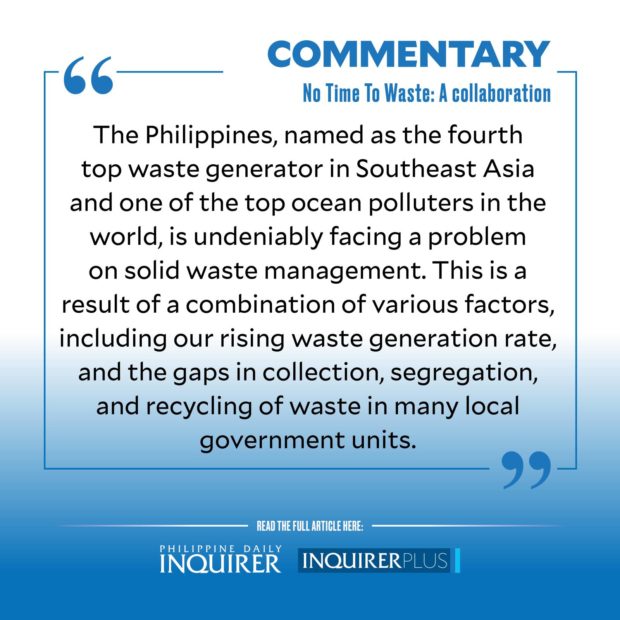No Time To Waste: A collaboration
The Philippines, named as the fourth top waste generator in Southeast Asia and one of the top ocean polluters in the world, is undeniably facing a problem on solid waste management (SWM). This is a result of a combination of various factors, including our rising waste generation rate, and the gaps in collection, segregation, and recycling of waste in many local government units (LGU).
This was even exacerbated by the pandemic due to the increased health care waste from the use of face masks and other personal protective equipment, as well as single-use plastics from food deliveries and online shopping. Around 1,400 metric tons of health care waste was generated every day from June 2020 to April 2022, according to the Environmental Management Bureau (EMB). It also projected that from 2022 to 2025, the country’s generated waste will reach 92 million tons in total.
A 2020 report by the World Wildlife Fund also found that 35 percent of the total plastic waste produced in the Philippines is leaked to the environment, while only 33 percent is collected and disposed to sanitary landfills and a measly 9 percent is recycled. These are not just simple numbers and data. Improper waste disposal directly contributes to global warming and climate change through methane emission from the decomposition and/or burning of waste.
While all these may be daunting, it’s good to know that part of the solution is within our hands. The government, through the Department of Environment and Natural Resources (DENR), the National Solid Waste Management Commission (NSWMC), and LGUs, together with partners in the private sector—we all have a role to play in order for us to achieve a waste-free future.
What we are doing. As required by the law, the DENR has already closed down 1,174 open dumpsites and is looking to establish more sanitary landfills across the country to provide a safer and more eco-friendly way of waste disposal. We are also supporting the construction of materials recovery facilities (MRF) in LGUs, specifically in barangays, in order to help them collect, segregate, and recycle their waste more efficiently, and reduce the amount of waste that ends up in landfills. Just recently, we have turned over newly built MRFs in Lipa City and Caloocan City with the help of our partners in Nestlé Philippines.
We believe that one way to address the gaps in our SWM system is through education and awareness. Aligned with this, the DENR and NSWMC have partnered with Nestlé Philippines for the No Time To Waste campaign, an information-education campaign that aims to drive new behaviors and understanding among LGUs and communities about proper SWM and its importance through webinars and capacity-building activities.
Being the first multinational fast-moving consumer goods company in the country to declare plastic neutrality, Nestlé Philippines is an example of how private sector participation can help in SWM. Plastic neutrality, or recovering the equivalent amount of plastic a company/organization has put in the market, is also a voluntary form of extended producer responsibility, which makes Nestlé Philippines an advocate for EPR as well.
Using its experience in tackling waste, Nestlé Philippines helped in the development of five modules to be utilized for the campaign, which are specifically targeted toward barangay officials, SWM officers, and community leaders. The modules tackle the following topics: (1) what waste has to do with climate change and the environment, (2) climate change and Republic Act No. 9003, (3) action planning for solid waste management, (4) designing an MRF and addressing limitations with alternative steps, and (5) citizens’ guide to proper waste management.
Through the No Time To Waste campaign, the DENR, NSWMC, and Nestlé Philippines hope to impart the best practices and tools on SWM to LGUs that they can apply and put into practice in their own respective communities, and in turn, help improve how they collect, segregate, and recycle their solid waste.
Like our partnership with Nestlé Philippines, DENR welcomes collaborative projects with the private sector and other groups. By working together and with urgency, we can succeed in tackling the plastic waste crisis.
—————–
Analiza Rebuelta-Teh is currently the DENR undersecretary for finance, information systems, and climate change. She finished her Bachelor of Laws at the University of the Philippines and became a member of the bar in 1998. She was recognized as one of the UP College of Law Alumni for Public Service.





















